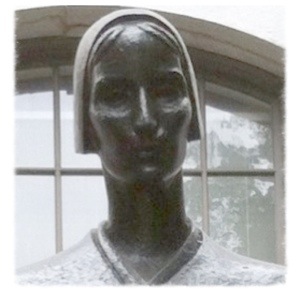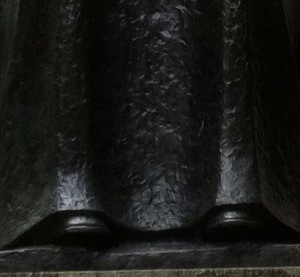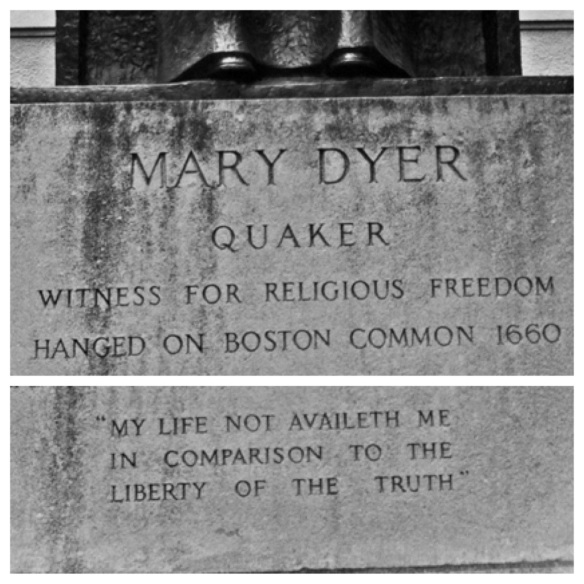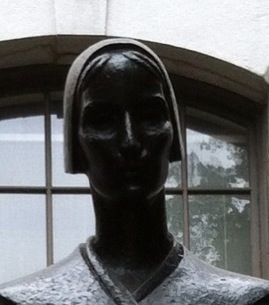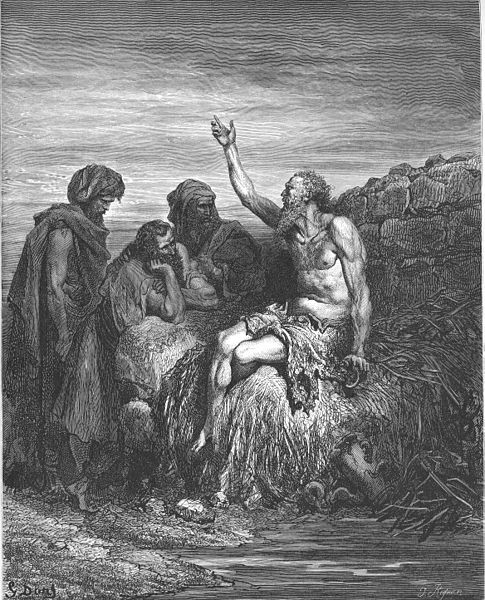ESR student Brent Walsh delivered the following message in Earlham School of Religion Worship on Thursday, April 25, 2013:
A
little girl was deep in concentration over her drawing. Her mother asked her
what she was drawing and she said, “God.” Her mother was confused and said,
“But no one knows what God looks like!” The little girl looked up from her
drawing and said, “Soon they will!”
How
tempting it is to think we know exactly what God is like.
I
Corinthians 13, Paul delivers a critical piece of insight
about spiritual pride. He
says, “If I speak in the tongues of men or of angels, but do not have love, I
am only a resounding gong or a clanging cymbal.
If I have the gift of prophecy… [and if I have] all knowledge, and if I
have faith that can move mountains, but do not have love, I am nothing.”
Imagine for a moment that I ask you to
come to my house for dinner because I know you’re hungry. I tell you that Jesus
loves you and so do I, but then I leave you in the kitchen to eat by yourself
because I have so much work to do, and I just don’t have time to sit around and
visit. Suddenly the meal would mean nothing to you. It’s just a meaningless
handout that might even make you feel worse about yourself. Yet this is
what many people think God wants them to do. Go to church, be nice to people,
work in the soup kitchen, tell people that Jesus loves them... but not actually
engage with people who need more than a handout.
But this is missing the point. It’s
when I sit down and ask you to pass me the rolls and inquire about your family
and ask your advice on what color to paint the kitchen – this is when we begin
to experience relationship-building; this is when you will start to recognize
my concern as authentic, and this is when you will start being interested in
what I have to say.
There
are some people who like to demonstrate the magnitude of their spiritual
cunning by answering every conceivable hardship with pithy little quotes:
·
“Everything happens for a reason.”
·
“What goes around comes around.”
·
“Everything will work out the way it’s supposed to.”
·
“Forgive and forget.”
·
“You made your bed; now you have to sleep in it.”
·
“Don’t take life so seriously.”
·
“It won’t do you any good to worry; there’s nothing you can
do about it anyway.”
The
problem is, these quotes don’t usually help. They might be true, or they might
not, but in the end, they are just witty little band aids that only insult
a person’s wounded heart.
It’s
kind of like that old fable about the North Wind and the Sun who compete to see
who can make a passing traveler remove his coat. The North Wind went first,
blowing with all its might, trying to force the coat off the man’s back. But
the harder the wind blew, the tighter the man pulled his coat around him. He
turned his back to the wind, hiding his face from the onslaught of blowing
objects. The more the wind tried, the more the man resisted.
Finally,
when it was the Sun’s turn, it shone down gently. The traveler lifted his face
to the sky and was comforted by the warmth of the sun. Eventually he removed
his coat willingly.
Often
times we do whatever we can to force people into thinking or feeling the way we
think they should.
·
We pummel them with logic, reason, and common sense
·
We tell them to be realistic… to get with the program
·
We read them scripture verses or quotes from wise authors
·
If they’re younger than we are, we might tell them stories
about the way things were when we were their age
But
the more we try to force our way of thinking onto them, they just turn their
backs and hide their faces from us. They pull their coats tighter around them
to protect themselves from our onslaught of coercion.
I
believe we should learn to take the approach that the Sun took in this ancient
fable. Instead of coercion we should offer conversation. We should listen to
where they are coming from, and then find out how we can best help them along
their journey. Only then will they turn their faces our way. You might even find that they drop their defenses,
remove their coat, and really start to open up to us.
This
can be especially difficult when someone we care about is experiencing some
sort of pain. We often feel so uncomfortable around other people’s pain that we
try to think of something… ANYTHING to say that will make them feel better. But
we must be careful that we are not offering these words for selfish reasons,
simply because we feel uncomfortable seeing them in pain. And we should also be
sure that we’re not just trying to fill up empty space with words so we don’t
feel helpless.
In
the Old Testament story of Job, three friends gathered around him to try to
help him find answers for all the hardship he was facing. They all spoke to Job based on their best experience of God… their best
theology. They said that God is always faithful to the righteous and always
punishes the wicked. They were sure that there was some sort of sin in Job’s
life to anger God in such a way. They really wanted to help Job get to the
bottom of things so he could turn his life around. Maybe they felt helpless,
and were trying to think of SOMETHING to say that might help.
But
then in Job 38 we see God becoming very upset with Job’s friends. God said, “Who are these people who obscure my plans using words without knowledge?” God was accusing Job’s
friends of using a lot of words that sounded very religious and holy, but in the
end delivering an absolute load of bunk! God was saying that these men were
putting words into God’s mouth that didn’t belong there.
At a
funeral a young pastor was trying to help the grieving family who had lost
their newborn child. The pastor stood beside the casket and put his hand on the
mother’s shoulder. She had been trying to conceive a child for many years, and
when she had given birth to her daughter, it had been an answer to her prayers.
But tragically, one morning the infant was found dead in her crib. The doctors
had no explanation, so they called it SIDS, which stands for Sudden Infant
Death Syndrome. The family was distraught, not just because of the loss of the
child, but also because of the mystery surrounding the child’s death.
Quietly,
and with much love and concern, the young minister turned to the mother and
said, “God must have needed another angel, and there was never a more beautiful
angel than your sweet daughter.” The mother turned to him, the tears still wet
on her cheeks, and with anger boiling up inside her, she said, “God has enough
angels. I hate God for taking
the ONLY angel I’ve ever had.”
You
see, the minister was just trying to help. He was nervous, and he was just
trying to think of SOMETHING to say that would ease this woman’s pain. But what
he failed to understand was that there was nothing
anyone could ever say to make the woman feel better about losing her
only child. The only thing his words accomplished was to make the woman angry
at God. He was putting words in God’s mouth that didn’t belong there.
There
just has to be a better way to share
our witness about the love of God than to use words like these.
Little
Justin was four years old, and he was terrified of thunderstorms. One night he was staying with his grandfather,
who tucked him into bed just as a thunderstorm was rolling through. After a
loud crack of thunder, Justin snuck out of bed and made his way down to the den
where his grandfather was reading.
“I’m
scared,” he said, and his grandfather turned around in his chair.
“Don’t
worry, Justin,” he said. “You’ll be alright. Just remember God loves you.”
“I
know God loves me,” Justin cried, “but I
need someone with skin on.”
Sometimes
I believe that God puts us in people’s lives, not to give them wise words of
wisdom, but just to be there… the presence of God… with skin on.
In 1 Corinthians chapter 9, Paul says
something very interesting. He says, “Though
I am free and belong to no one, I have made myself a slave to everyone, to win
as many as possible. To the Jews I became like a Jew, to win the Jews. To those
under the law I became like one under the law…
To the weak I became weak…
I have become all things to all people so that by all possible means I
might help some. I do all this for the sake of the gospel...”
Now,
it’s pretty easy to follow Paul’s train of thought for the most part; it’s a
familiar concept: While in Rome, do as the Romans do. But then we get to the
weakness part. “To the weak I became weak?” That doesn’t make sense at all.
Wouldn’t it be better to offer strength
to the weak? Isn’t that what God does? When I’m exhausted, when I’m distressed,
when I’m worried, when I’m lonely, when I’m scared… doesn’t God offer me
strength? Wouldn’t it do more harm than good if I were to make myself weak to
join someone else in their weakness?
A
very dear friend from right here at ESR tells the story of a time when she was
working as a chaplain in a hospital. Lisa Walden says that she was called to
the Emergency Room around midnight one evening. A woman had found her seventeen
year old son dead in his bedroom by a self-inflicted gunshot to the head. The
boy had been taken to the morgue; the mother had been brought to the emergency
room.
Lisa writes:
As I walked into the department, I heard terrible
screams and wailing. The emergency staff gave me looks of pity as I walked by.
The looks seemed to say “I’m so glad it is you and not me going in there.”
I knocked on the woman’s door and the nurse opened.
Relief washed over his face as he left; the screaming woman didn’t notice the
change of guard. An ER tech sat beside the patient, nervously rubbing the
mother’s arm and trying to get her to calm down, while I just stood quietly at
the woman’s feet. After a few minutes, the tech turned to me and said she just
couldn’t take any more of it and promptly left the room.
I moved a chair next to the bed and said nothing as
she thrashed about her bed with the pain that was ripping her heart out. She
looked at me as she screamed the images which were burned into her mind. Every
once in a while I would gently echo her, “He was too young,” and “You love him
with your life.”
She continued to scream, and I felt no compulsion to
quiet her for my own comfort. I observed my inner voice calmly reassuring both
of us, “I’m not afraid of your pain.” I was here to companion the terror of
this mortally wounded woman. I needed to take off my shoes, for I realized we
were both being held within the holy.
Gandhi said: “It
is better to have a heart without words than words without a heart.”
When
someone is traumatized by the enormity of a painful situation, they don’t need
a show of strength to make them feel better. The woman in the hospital bed
didn’t need a nurse standing over her saying that everything would be okay. She
didn’t need a chaplain coming in to tell her that “time heals all wounds,” or
that “God loves you and wants you to be strong.”
Love
and compassion are critical at a time like this. She needed to feel the anguish. She needed
someone who would recognize her terror and stand there with her, facing it
head-on while her mouth went dry from the screams.
“People
don’t care how much you know until they know how much you care.”
So
many of us think we have to know what to say when people face the storms of
life. We’re looking for solid formulas, brilliant advice, or maybe even magic wands that will help us come up
with just the right words of wisdom for the people we minister to.
The
finest words of wisdom I’ve heard so far were spoken by… Winnie the Pooh, who said, “It is more fun to
talk with someone who doesn't use long, difficult words but rather short, easy
words like ‘What about lunch?’”
Instead
of trying to teach people how to live or what to believe, it’s far better to
listen and discover where they are in their life… and then offer conversation instead of coercion.
In closing, allow
me to share this final story:
A
group of Navy SEALs flew into a remote location by helicopter and secretly made
their way to the enemy compound. As soon as they reached the dark, filthy room
where the hostages had been held for months, they stormed through the door and
found them curled up tightly on floor. The SEALs yelled at them, “We are American
soldiers and we’re here to rescue you!” The soldiers demanded that the hostages
follow, but they wouldn’t. You see, they didn’t believe the soldiers were
really American. They had been tricked before, and they were scared. They just
stayed huddled in the corner hiding their eyes.
The
SEALs didn’t know what to do. There was no way they could carry all these
people out of there. Finally one of the soldiers had an idea. He put down his
weapon, took off his helmet, walked over to the hostages and curled up next to
them. He put his arms around them, softened his facial expression, and talked
quietly.
He
became one of them.
He
stayed there for a while until some of the hostages started looking at him.
None of the prison guards would have done this. Then the soldier shared his
message again. “We are American soldiers
and we’re here to rescue you. Will you follow us?” With that he stood to
his feet and one by one the hostages did the same. They were ready. They were
ready to go home.
No,
God doesn’t always offer strength
when we’re weak. Sometimes God comes to where we’re huddled in the corner and
just huddles there with us in our weakness and talks softly until we’re ready
to follow. Sometimes God stands by our bedsides when we can’t find the strength
to face the world, and holds our hands while we scream.
Sometimes
silence is the best gift we can offer
to someone. When we put our own beliefs aside, we can be present with them
right where they are.
Just as God became one of us, we are called to
take off our helmets, put aside our weapons, and just be there for each other, the presence of God with skin on… and only
use words when necessary.
“Though
I am free, I have made myself a slave to everyone…
To
the weak I became weak…” Amen

